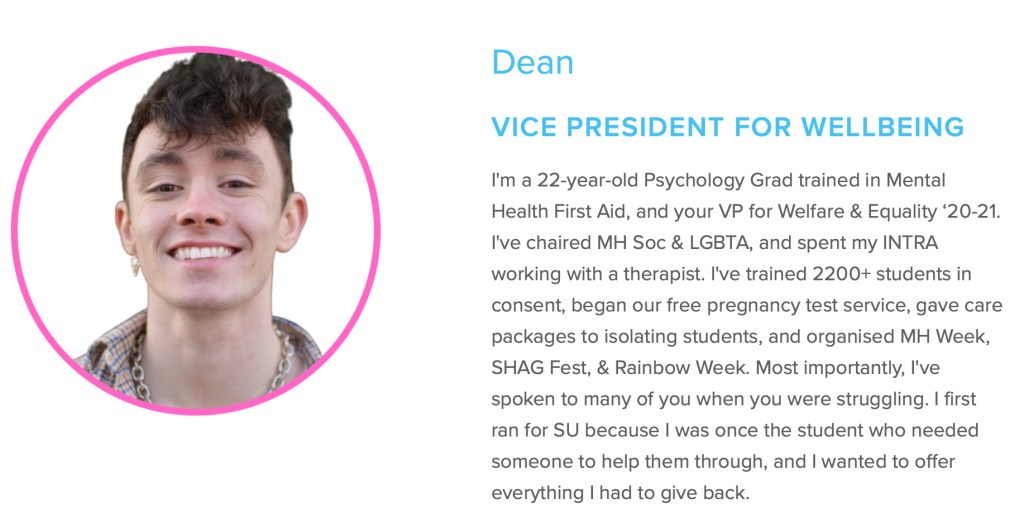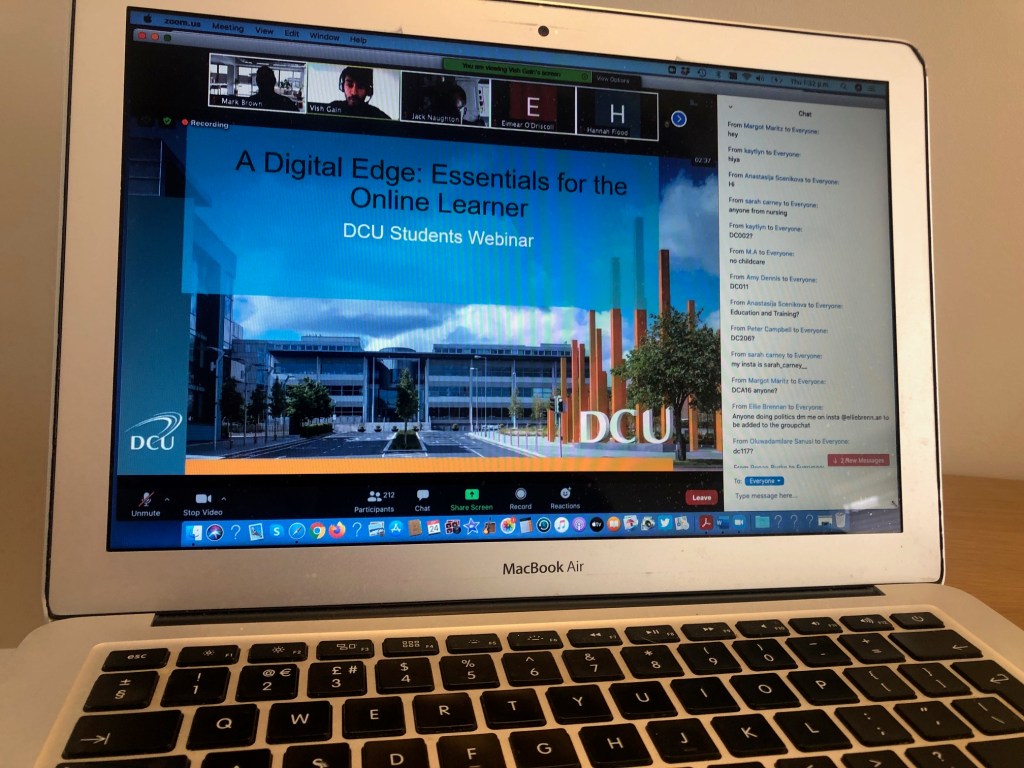Co-hosted by the Teaching Enhancement Unit and DCU Students’ Union, the inaugural DCU Accessibility Awareness Week (May 17th – 21st) aimed to get the DCU community talking, thinking and learning about accessibility and inclusive education.

The event drew on the expertise of staff within the DCU community and external contributors from across Ireland, the UK and Australia. We are particularly grateful to the following staff who gave so generously of their time in guiding the development of the programme: Donal Fitzpatrick, School of Computing; Rishi Gulati, School of Law and Government; Anne O’Connor, Head of Disability Service; Mary McGovern, Assistive Technology Coordinator; and our external advisor Dara Ryder CEO of AHEAD.

The Teaching Enhancement Unit’s approach to accessibility is underpinned by the principles of Universal Design for Learning, a framework developed to guide curriculum design to give all students equal opportunities to learn. While Accessibility Awareness Week addressed the broader student experience, the UDL framework was used to frame the teaching and learning aspect of the programme. You can learn more about Universal Design for Learning, and how this framework supports and intersects with Accessibility, on the TEU website.
The Programme
The programme was officially launched by DCU’s President, Professor Daire Keogh who reaffirmed our commitment to an inclusive university and highlighted some of the fantastic work happening across the University. Mindful of the many demands on staff time, the programme offered a mix of opportunities to engage with the programme.
Staff could dip into a selection of curated online resources; attend 30-minute practical workshops; or take a full hour to listen in and participate with the daily 60 minute panel discussions.
The majority of the workshops and panel discussions were recorded and are available now on the TEU website. Irish Sign Language (ISL) translators were present for the majority of the live events and live captions were available in Zoom.

The workshops, facilitated by experts from DCU and AHEAD, provided participants with strategies to make ‘small changes’ to their practice to make an impact on accessibility and inclusion. Recordings from these events, and additional supporting resources are available on the TEU website. The Equality, Diversity and Inclusion Unit based in HR, took the opportunity of Accessibility Awareness Week to launch a guideline for staff on Inclusive Ways of Working.
This guideline offers support to staff across the university in adopting inclusive ways of working – from how you design documents, to turning on closed captions for virtual meetings or how to better understand the role of pronouns.
The panel discussions offered rich food for thought from a range of perspectives including DCU staff, students and external experts in the field of accessibility and inclusive education. These insights will inform future work by the Teaching Enhancement Unit and DCUSU in creating a truly inclusive University experience for both staff and students. Recordings of these panel discussions are available on the TEU website in both video and audio formats.
An Authentic Student Voice
It was essential to the TEU and DCUSU that an authentic student voice informed the programme of events. Students past and present contributed to the panel discussions throughout the week, offering invaluable insights into their lived experience of accessibility and inclusive education. Tuesday’s student only panel was a true highlight of the week, with rich discussion around the impact of accessibility on the student experience of University.
In addition to including the student voice in the panel discussions, students with a lived experience of accessibility were invited to record a brief video to frame the workshop aspect of the programme. Catherine Gallagher, currently a PhD student in the School of Communication, poses four questions to consider in relation to accessibility and inclusion. Catherine’s questions in the above video offer a clear framework for those working in a University context to reflect on accessibility and inclusion in their day to day working practices.
The DCUSU perspective
DCU Students’ Union has long desired to improve the experience for students with disabilities, both nationally and locally. As VP for Welfare & Equality 2020-21, this was a key area of interest of mine for the year. Following on from the success of the Society Accessibility Policy, which I developed alongside the Society Life Committee and the Students with Disabilities Advisory Group (SwD AG), it was a fantastic opportunity to collaborate with the TEU on the inaugural Accessibility Awareness Week.
The key objective for this week was to centre lived experiences of students with disabilities and take those as a lead for how to best improve the teaching and learning experience.
It was truly a pleasure to work alongside the SwD AG and TEU on the project. At each step, the student experience was always considered.

It was a great honour to chair the Student Panel and facilitate the conversation between Catherine, Bobbie, & Kate. The honesty that the students offered was inspiring and insightful. From that panel, and indeed from the week itself, it was clear that inclusive practices in Higher Education aren’t burdensome. Often, it is small adjustments and some simple questions that go a long way.
I hope to see the week only grow and expand as the years go on, and I’m proud to have been part of its first iteration.
Dean O’Reilly
Plans for 2022
Feedback from participants on the inaugural Accessibility Awareness Week was most positive, and we hope that the event will become a permanent fixture on the DCU calendar. While this year focused largely on raising accessibility awareness for staff, we aim to broaden the programme towards raising student awareness of accessibility in 2022. A key suggestion from participants was to change the timing of the event. Taking on board this advice, next year’s Accessibility Awareness Week is planned for February 2022. If you are interested in being involved in next year’s event, please contact us at teaching.enhancement@dcu.ie
Thank yous
The TEU and DCUSU would like to thank all of those who contributed to the inaugural Accessibility Awareness Week.
Trevor Boland, AHEAD (External); Karen Buckley, School of Special & Inclusive Education; Kevin Cogan, DCU student and creator of Dyslex.ie; Lorna Greene, EDI Unit; Donal Fitzpatrick, School of Computing; Catherine Gallagher, PhD student, School of Communications; Tracy Galvin, Queen’s University Belfast (External); Kate Goodman, Vice President for Academic Life, DCUSU; Rishi Gulati, School of Law & Government; Bobbie Hickey, VP for Diversity and Inclusion, DCUSU; David Kennedy, School of Human Development; Evelyn Kelleher, School of Nursing, Psychotherapy and Community Health; Kate Lister, Open University, UK (External); Mary McGovern, Information Systems Services; Rob Lowney, Teaching Enhancement Unit; Huy Nguyen, CEO/Founder Enabler Interactive (External); Anne O’Connor, Disability & Learning Support Service; Michael O’Connor, former DCU student; Lisa Padden, UCD (External); Nicholas Parsons, Senior Solicitor and Chair of the Disability, Subcommittee of the Law Society of New South Wales Diversity and Inclusion Committee (External); Donal Rice, National Disability Authority (External); Dara Ryder, AHEAD (External); Ms Renata Zanetti, Independent Consultant (External).




